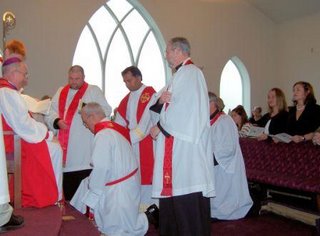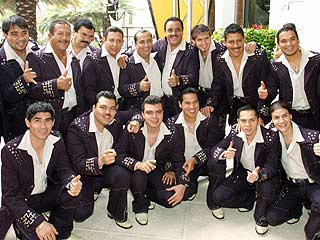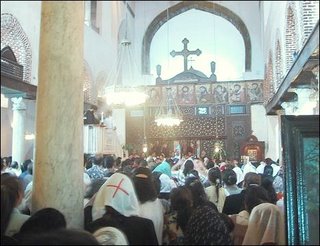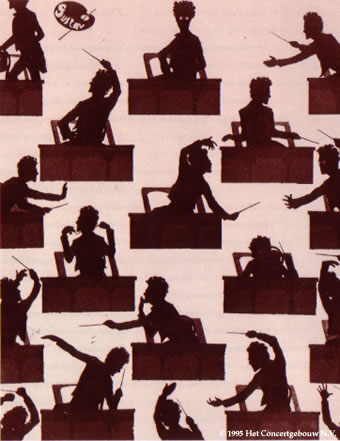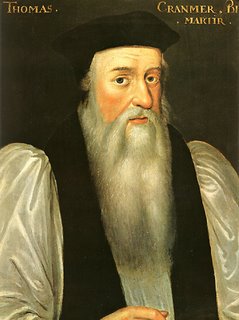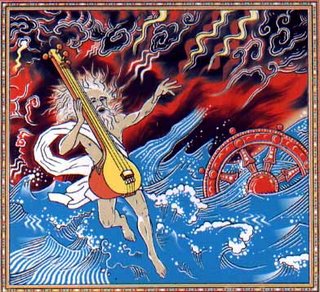 Part VII- If I Had Not Destroyed Myself Completely, I Should Not Have Been Able To Rebuild And Shape Myself Again (Abba Alonius)
Part VII- If I Had Not Destroyed Myself Completely, I Should Not Have Been Able To Rebuild And Shape Myself Again (Abba Alonius)
BuildingLa Reja, Argentina 2002 -Abba Lot went to see Abba Joseph and said to him, “Abba, as far as I can, I say my little office, I fast a little, I pray and meditate, I live in peace and as far as I can, I purify my thoughts. What else can I do?” Then the old man stood up and stretched his hands toward heaven. His fingers became like ten lamps of fire and he said to him, “If you will, you can become all flame.”I look up from the bench I am kneeling on to the apse of the church. The sun will not come up today behind that layer of clouds. The morning will be gray again, and the sun will not pierce its rays through the small windows that hover over the altar. It would be gloomy again. Pleasant but gloomy.
Then I hear the two knocks. That means time to wrap up the meditation. Sorry, Lord this hasn't been a very good one. How, I thought, could I be focused after the coversation I had with my spiritual director yesterday. A monk? What makes him think I can be a monk? I came all of these thousands of miles, gave up everything I had ever known, and for what? Yes, part of me is relieved, even elated. But why me, Lord? I am not the holiest one here. I am not even a very good seminarian compared to all of these guys. Look at good old F. over there. That guy is practically a saint. Could I make it in a monastery?
Angelus Domini nuntiavit Mariae.... There goes the meditation. I get up after the
Angelus and walk quickly to the altar I am serving on in the apse and help the priest vest. Fortuneatly, the priest I am serving for says his Mass quicker than the priest on the altar. (My spiritual director.... always takes his sweet time!) I struggle to hear my priest in the midst of four other Masses going on all around me:"
Confitebor tibi in cithara, Deus, Deus meus......omnes sanctos et te Pater.......et quare conturbas me?Lectio Epistolae Sancti Pauli Apostoli...Whispers deflecting off whispers, shuffling of feet, the turning of pages, the din of newly consecrated stone..... I always keep score of who is where in their Mass. There is a mysticism about it, of pure doing without contemplation. It is the prayer of just being alive and awake. I take Communion, and shortly afterwards help the priest unvest. I rush to put away the vestments, empty the cruets, cover up the side altar, and get back to my place before breakfast starts so I can at least get in a modest thanksgiving after Holy Communion. I say in an
Anima Christi and a few other prayers, and I get up and go to breakfast, which I eat quickly, as usual. (Indeed, I am always made fun of because of how quickly I scarf my breakfast down.)
I reach the dishroom and turn on the water. The loud gushing breaks the silence of the morning. I put the large red container in the Stone Age-looking sink and begin to fill it. As hot as I can take it without burning myself.... that is the rule. I begin to wash all of the left-over dishes, having rolled up the sleeves of my cassock so that they don't get wet. I look up at the crucifix placed over the sink, and tears well up in my eyes."A monk, Lord? That is too much. But Thy will be done. Thy will be done."
In silence. Everything in silence. My work partner finally arrives and I intone the prayer:
Ave Maria, gratia plena, Dominus tecum....
Everything begins with a prayer here. We finish fairly quickly, and I have just enough time to go comfortably up to my room, get my things, and descend for the first class starting at nine o'clock.
Throughout the day, all I can think of is that I might be leaving all of this soon. I had made such good friends and the SSPX and its faithful down here have always been good to me. No, it's not like I am leaving tommorrow, but still, what is to become of all of it? I can hardly do anything. All things are marked by uncertainty and fear. Sure, I have read all of those sayings of the Desert Fathers, the Philokalia, St. Gregory Palamas, but does that mean I am ready to "put it into practice"? God has brought me up this high only to say that I need to come of even higher, give up even more, strive even harder to return His love for me. Yes, I am scared. Very scared.
Night finally comes. I enter the recreation room with my usual smile. I have tried throughout the day to conceal my angst and forboding. Then, I go to my favorite book in the recreation room:
Athos: The Holy Mountain by Philip Sherrard. I turn to the last page of the book, and my eyes rest again on that defintion of a monk by St. Symeon the New Theologian:
Solitary, one who is unmixed with the worldAnd speaks continually with God alone. Seeing, he is seen,And loving he is loved, And he becomes light glimmering unspeakably,Blessed he feels himself all the more poor,And being close, yet goes a stranger.O miracle strange in every way and inexplicable!For immense riches I exist penniless,And having as I think nothing possess much, And I say I thirst in the midst of waters."Sicut cervus desiderat ad fontes aquarum, I think to myself as I exit the church after Compline. This is Great Silence, and I see many seminarians and priests walking about with rosaries in hand, praying to God in their hearts. In silence, in love. My heart thirsts after Thee, O God.... Whatever you want, I will do it. I exit the cloister briefly and look up at the sky. To the west, there is the dim glow that is the city of Buenos Aires; to the east, the darkened sky of the pampa. I trust Thee, O my God.
Fiat voluntas tua. I go up to my cell.
Tommorrow I have a Latin test. It's all going to be alright.
BreakingBig Bear Lake, U.S.A 2005One of the Fathers asked Abba John the Dwarf, "What is a monk? He said, "He is toil. The monk toils at all he does. That is what a monk is."Brother Cassian looked out of the window of the bakery and saw the dirty white glowing sign of the resort across the street. A truck comes up, its chains beating against the icy road in front of the store. The sheeter makes its usual unpleasant loud sound, and the monk stood in artificial light, alone and unwilling to move. Fourteen hours, he thought to himself. That wasn't too bad. It started with Midnight Office at the metochion, after which he had to make invoices, make deliveries, come back and begin to bake, sort, package and clean up. Fourteen hours. Not as bad as some days.He went over to say goodbye to his fellow monk who was working in the back on a different shift.
Then he looked out the window again. Snow was falling. He was hungry and tired, but he did not know what he would do once he got home. It was Great Lent, and he had eaten very little over the course of the day (he was too busy and there was nothing he could eat anyway.) He reluctantly moved toward the door for the short walk back to the house. He went outside and found it really was not that unpleasant. Another truck passed, headlights blaring, chains clanging. Cassian made sure his footing was good on the icy road, and was much more assured once his feet touched the newly fallen powdery snow.
This is what it all had come to: living an hour and a half away from the monastery, working to sustain a place he didn't even live in. He hadn't even been a monk a year now, and he felt so miserable. He had no time to read, no time to pray, no time to even eat or sleep anything close to the minimum of what a human being should expect to do. But these were evil thoughts, doubtful thoughts. Whatever happened to watering the stick? Well, his stick just happened to be very, very far from the monastery. Besides, this was only temporary, like the abbot said. He had to put up with it a little longer. He had been tonsured, right? The old man, that Arturo Vasquez, was dead now. What does it matter if that corpse now has to work long hours in the dreariest job imaginable, being tried by the heat of ovens, the noise of mixers, and the hastles of taking orders and loading vans? Did he think that when he joined it was going to be a cake walk? Maybe he was just psychologically damaged like his abbot said. Maybe he was just lazy.
No, he thought to himself. I come from a family of fieldworkers, my first nursery school was a cucumber field, I began to work for money when I was five.....
There you go trying to justify yourself again, Cassian. Have you learned nothing from the Fathers? Think only positive thoughts. You are dead now, and dead people don't complain!
You are right, God forgive me! I am so wretched. Lord Jesus Christ, Son of God, have mercy on me......
The newly fallen snow made the sound of shards of glass breaking as he trampled it under his feet. Again in the distance, another vehicle was heard like the waves of the ocean crashing against the shore. The flakes fell steadily. "I am going to make it," he said to himself, "even if it kills me. I will not fail You, God. It isn't really that bad. It isn't really...."
He came to a blanket of yellow light falling on the ground from a lamp above. Through its ray, snowflakes reflected transparent in the night before they touched the ground, joining the ever-growing layer under his feet. It was all so beautiful, he thought, like the angels falling from heaven before the creation of the material world, through the eon of that fatal decision that caused him to be standing there, solitary and immoveable, a lone charcoal black figure in the midst of the pure white, snow-covered landscape. Tears mixed with the snow that was beginning to cover his beard. His heart writhed in agony. He simply didn't know what to do.
Forgive me Lord, I am so tired. I will try to do better tommorrow. Lord, forgive...... forgive..........
Cassian looked back to see the solitary set of footprints being slowly filled with snow. He couldn't stay there. He had to go on.
He reached the dark porch and saw the other two monks through the window. He stood again motionless. He didn't have the will to face them. He looked up at the sky again. No stars, only gray and black. He put his hand on the door knob and turned it.......
**************************
Yes, I killed that monk. And I will not try to justify it. I will only know at the Judgment Seat if I did the right thing. We want moral certainty in our lives, we want to know that we are in God's grace, that we are doing the right thing at every step. But that is not possible. I live with this stain in the center of my soul, and I don't know how I will get rid of it. Maybe I never will.
What happens when your dream goes bad, when things go so wrong that you can't possibly conceive a way out? On my worst days, I fear God's judgments, I fear that I have been selfish, that I am flaky, that I will never amount to anything in His eyes. But I chose this path, and it was either this or the abyss. It was not a glorious resurrection, but a resurrection of this body of death, the old man, and self-will. I had to destroy Cassian in order to rebuild and shape myself again. May God have mercy on me for doing it! All I know is that life is not what it is like in books. The reality is much more raw, unforgiving and terrifying. But above all, I finally understood this:
Do not give your heart to that which does not satisfy your heart.-Abba Poemen


